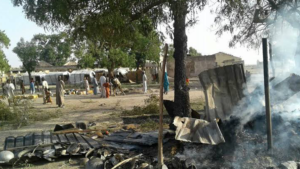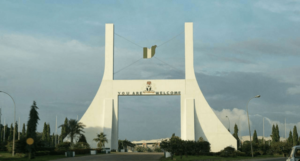2023 was a challenging year for Nigerians when it comes to security of lives and properties. In this article, Jumoke Olasunkanmi recaps major happenings within the year.
Kidnapping, banditry and other criminal vices gained ground in the security crisis spanning across the country. Many Nigerians hoped that the arrival of a new administration would lead to an improvement in the security of lives and properties across the country. But that hope has been dashed to smithereens as crime and criminality took a turn for the worse.
Tundun Biri ‘Mistake’ Bombing
One of the most shocking incidents in security is the recent blunder where military personnel charged with the responsibility of protecting the Nigerian masses fired a drone strike that killed 85 civilians in Tudun Biri Village in Kaduna State on December 3.
A Nigerian Air Force drone targeting ‘terrorists and bandits’ struck a gathering of civilians celebrating Maulud, leaving 85 dead and more wounded.

President Tinubu’s spokesperson, Ajuri Ngelale, described the incident as a ‘bombing mishap.’ However, this ‘mistake’ is not the first of its kind. In January 17, 2022, the first Air Force misfire landed in Rann, a community in Borno State, killing 126 people, including children, voluntary workers and refugees. There have been no fewer than 12 more cases of the Air Force misfiring residential areas, leaving a trail of sorrow, tears and blood in their supposed quest to end insurgency.
In October 2022, NAF announced an investigation of accidental airstrikes on civilians during the course of military operations. It claimed the investigation would help prevent further occurrences but there has been no update since then.
From the arid areas of the Lake Chad basin in Northern Nigeria to the savannas of the plateau, the towering hills of the South West and the lush forests of the South East, the federal government of Nigeria continues to confront a challenging security dilemma that continues to cost the country expensively in budgetary allocations and its sheer cost in human lives.
Sit-at-Home in the Southeast, Banditry in the North, Kidnapping Everywhere Else
On Christmas day, which happened to be on a Monday, many Nigerians in the southeast could not step out of their houses as they complied with the Simon Ekpa-led Indigenous People Of Biafra (IPOB) order which prohibits movement in the area on Mondays. Though there have been promises by some leaders in the region, both security and political, to put an end to the killings that follow any attempt to violate the sit-at-home order, no progress has been made.
In the Northwest, banditry continues to take countless lives daily. Zamfara, Kaduna, Katsina and even hitherto Taraba are plagued with this evil. On Christmas eve, over a hundred lives, as revealed by Governor Caleb Muftwang, were cut short by bandits in Bokkos and Mangu Local Government Areas in Plateau State, Northcentral Nigeria. Everywhere else in the country, kidnapping became the order of the day, even within the confines of the home.

The Nigerian Security Report from Beacon Intel showed over 700 cases of kidnapping in the first three months of the year with the North Central having the highest cases (325).
Similar data from SBM – a research and consulting firm – showed that at least 3,620 people were kidnapped in 582 cases that left 430 killed and N5 billion demanded as ransom. The report noted that these figure may be higher as most cases are not reported or documented.
By the first quarter of 2023, deaths from insecurity had increased by 1300 per cent in the Southeast. The Northwest also witnessed 649 per cent increase, 74 percent increase in the Northcentral. 50 percent increase in the Southsouth and 30 percent increase in the Southwest, according to Statisense.
The spate of insecurity cost Nigeria a spot in the 2023 Global Peace Index’s 15 Most Peaceful Country in Africa.
Security Collapse in the FCT
Kidnapping for ransom became a flourishing business in many states across the country with a particularly strong hold in the Federal Capital Territory (FCT).
The FCT, which houses most of the security agencies’ headquarters, has become an unsafe route to reside with news of kidnapping, robbery and ‘one-chance’ surfacing daily.
Erstwhile considered as one of the safest places in Nigeria, the FCT and its surroundings have been under various attacks and reported security breaches. Road side robberies have also increased, even in the city centres.

A resident of the FCT, Emmanuel Temitope, who has lived in several parts in the last 15 years, remarked that recent times have been the most contentious.
“There used to be the sense of safety when you got around Abuja. This is the seat of power and the presence of government and security agencies was adequately felt,” Mr Temitope said. “Now, it feels like a lifetime later with reports of ‘one chance’ almost every day and other reported terrorist activities that we have going on.”
“These days the government is so not in charge,” he added.
Abduction of National Youth Service Corps (NYSC) members
This menace was also notoriously popular this year. Among some of the cases that shook the country is the abduction of 15 corps members in Anambra on February 14.
They were taken along Onitsha-Owerri road in Ihiala on their way to Lagos after 3 weeks orientation camp in Imo.
Timely intervention by the state police led to their rescue the following day. The Anambra State Police Public Relations Officer, Tochukwu Ikenga, confirmed their release and added that they were unhurt.

The story is however different for the eight Akwa-Ibom graduates who were abducted alongside their bus driver in Zamfara enroute NYSC orientation camp in Sokoto on August 17.
These young graduates have spent over four months in captivity despite assurances from security agencies and NYSC itself, leaving their parents and concerned Nigerians in despair over their well-being.
Kidnapping of Students from Schools
On September 22, gunmen invaded the Federal University Gusau in Zamfara State and kidnapped 24 female students. Security forces reportedly rescued thirteen students, but 11 remain in captivity.
Less than two weeks later, on October 4, suspected terrorists attacked the Federal University in Katsina and kidnapped five female students.
Similarly, on October 10, gunmen kidnapped four students from Nasarawa State University.
The three kidnappings occurred within 19 days, raising alarms among parents, teachers, and student bodies.

“Students cannot go to school and be safe in school,” Kayode Babayomi, chair of the African Action Congress (AAC) in Oyo State remarked.
Mr Babayomi who is also a security enthusiast in a chat with African Health Report (AHR), said that the government has allowed the kidnapping situation to get complicated by its inaction and failure to prevent them from occurring.
“What we are seeing is that the centre point of the issue has changed. From known bandit groups who are often under the surveillance of the authorities, the banditry issue has now become an industry with local attaches in remote villages and farm settlements.
“No country can thrive in this manner,” he said.
Security Alerts by Foreign Governments
The country went into panic mode at several times, driven by relentless security notices shared by foreign authorities. Most recently in November, citing high-level intelligence, the United States embassy and consulate in Nigeria raised alarm about threats of possible terrorist attacks in Nigeria. The Australian embassy, Canadian and the United Kingdom also issued similar alerts during the year.
Appointment of New Service Chiefs
In July, President Bola Tinubu appointed new service chiefs to implement his security agenda. They are Chief of Defence Staff (CDS), General Christopher Musa; Chief of Army Staff (COAS), Lt-General Taoreed Lagbaja; Chief of Air Staff (CAS), Air Marshal Hassan Abubakar, and Chief of Naval Staff (CNS), Vice Admiral Emmanuel Ogalla.
Amidst the dire situation, Nigerians await the actualisation of the promises of the ‘Renewed Hope’ administration to turn things around in the coming year.



